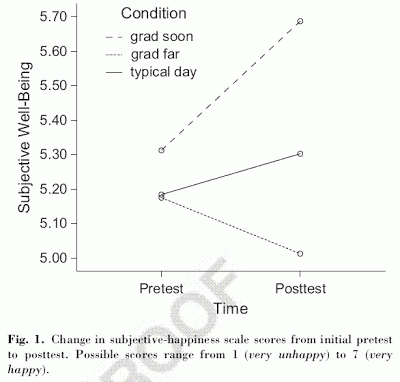Humanists believe that this life is all we have. Now, this is a very disturbing idea for a lot of people who feel that, without a hope of life after death, life itself becomes meaningless. Humanists, on the other hand, argue that the very fact that life is limited gives it greater meaning – because if you only have a short period to exist you’d better go out and make the most of it. Hence the motto of the British Humanist Association – For the one life we have.
So who’s right? It’s largely a philosophical question, of course, but there are a few snippets of evidence to bring to bear, one of which is a study of American college students that was published in December.
What the investigator, Jaime Kurtz of Pomona College in California, wanted to know was whether ‘temporal scarcity’ (the feeling that you have only a limited time left to enjoy something) makes you happier or sadder. So she gave her volunteers, who were final year students due to graduate in 6 weeks, a happiness questionnaire. She also asked them to write about their college experiences.
The clever bit was that she told a third of them that ‘You have only a short amount of time left to spend at UVA. In fact, you have about 1,200 hours left before graduation.’ And she told another third something subtly different: ‘You have a significant amount of time left to spend at UVA. In fact, you have about 1/10th of a year left before graduation.’ There was also a control condition, where volunteers were simply asked to write about a typical day.
 Then, over the next two weeks, they were asked to fill in four similar surveys. At the end of the two weeks, they filled in the happiness scale again. The results are shown in the figure.
Then, over the next two weeks, they were asked to fill in four similar surveys. At the end of the two weeks, they filled in the happiness scale again. The results are shown in the figure.
There was a clear and striking effect. Happiness went up in those who were told they didn’t have much time left, and went down in in those who were made to think they had lots of time.
Why did this happen? Well what happened in the group who were made to feel time-short was that they started participating much more in college activities. Kurtz concluded:
Although it may seem counterintuitive, the present study found that focusing on the impending ending of college promoted enhanced subjective well-being over the course of 2 weeks and resulted in greater participation in college-related activities … A likely possibility for increased subjective well-being in the grad-soon condition is that these participants reaped the psychological benefits associated with social engagement and connectedness as they became more engaged in college life over the course of 2 weeks. After all, strong social support and meaningful relationships are among the strongest predictors of happiness.
What makes these results particularly interesting is that you would not intuitively expect that telling people that a happy part of their life would soon end, and asking them to reminisce about the good times they’d had, would make them more happy. But it did – because it made them determined to make the most of the time they had left.
Can these findings be directly extrapolated to the contrast between mortality and life everlasting? No, clearly not. But you can expect the same psychological mechanisms to be at play, which adds a little bit of spice to the debate. As Kurtz says:
According to Cialdini’s (1993) scarcity principle, when a resource becomes scarce, it increases in value. If one thinks of time as one such limited resource, an awareness of its potential unavailability can increase the value of an experience, making it more likely to be enjoyed (e.g., Carstensen, Isaacowitz, & Charles, 1999). There are some people whose lives are imbued with this sense of temporal scarcity, and there are anecdotes to suggest that they are especially appreciative.
Jaime L. Kurtz (2008). Looking to the Future to Appreciate the Present: The Benefits of Perceived Temporal Scarcity Psychological Science, 19 (12), 1238-1241 DOI: 10.1111/j.1467-9280.2008.02231.x













